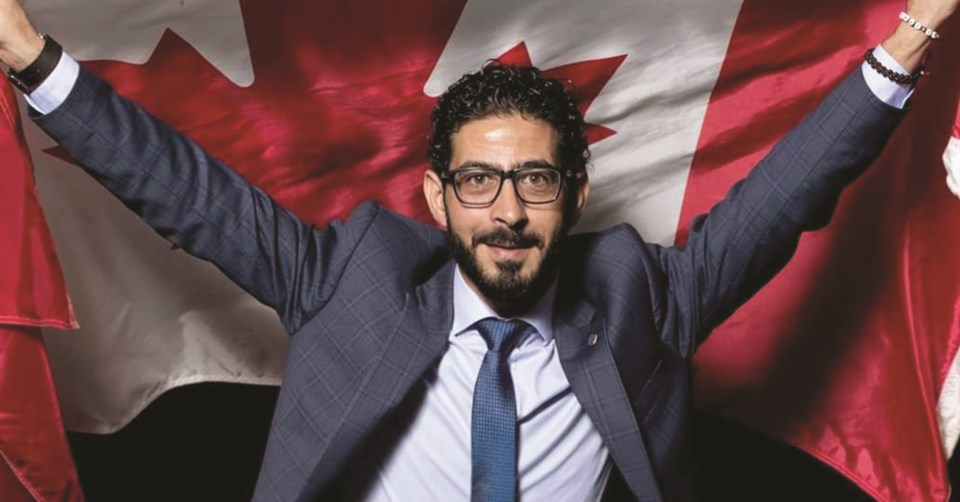World Refugee Day, held June 20, has grown increasingly busy for Hassan Al Kontar in the years since landing in Whistler as a refugee after being stranded in a Malaysian airport for seven long months in 2018.
Now residing in Vancouver, the Syrian activist—who is probably better known as “the man at the airport” after his Tom Hanks-esque ordeal attracted a media firestorm—has become a prominent voice for refugees worldwide thanks to his public speaking and work with the Canadian Red Cross. On World Refugee Day, Al Kontar had a jam-packed schedule that included two virtual talks to eager audiences in Ontario and Vancouver, as well as the launch of a Red Cross video he starred in.
But June 20 holds a deep significance to Al Kontar for another reason.
“I don’t know who decided to make the World Refugee Day same as Father’s Day,” he says. “That’s a lot of emotion for one person, especially for me.”
While Al Kontar’s unlikely journey to Canada was capped by triumph, it was lined with suffering. When civil war broke out in his native Syria back in 2011, he was working as a salesman in the United Arab Emirates, which denied his work visa renewal, leaving him with few options. He knew if he returned to Syria, he would be conscripted into the army by Bashar al-Assad’s notoriously brutal regime. He remained in the UAE illegally until 2017, when he was caught and sent to Malaysia, one of the only countries to accept Syrian travellers. Once his three-month tourist visa ran out, Al Kontar worked under the table for a year, with hopes to save enough money to board a flight to Ecuador, where he has family. But when he was about to board his flight, the airline turned him away. He tried to fly instead to Cambodia, but was denied entry and sent back to Kuala Lumpur, where he languished for months in an airport terminal, a man without a country, before spending two dark months in an immigration detention centre. He documented his ordeal on his Twitter account, amassing thousands of followers and the attention of a group of Whistlerites led by Laurie Cooper, who arranged for him to come to Canada, an experience he recounted in his new memoir, Man at the Airport: How Social Media Saved My Life.
Along the way, Al Kontar missed numerous family milestones, like his brother’s wedding. But it was not being there for the death of his father that has left the biggest mark.
“Writing about my father in my book was one of the hardest chapters. I remembered myself at Whistler at the time at the Scandinave Spa staff accommodation, and I delayed that chapter for a long time,” he says. “Then when I decided it was time, I couldn’t write it fully. I would write a line or two and then would run quickly outside for a quick walk, or a cup of coffee, or a shower, then I would come back and write another two lines. I was sweating, shaking. When I finished, I felt relieved.”
It’s just one of the many sacrifices Al Kontar has had to make to gain a new life on the opposite side of the world, but, if his path here was unique, the price he paid is not.
“All refugees are still paying the price [leaving] the ones they love behind,” he says. “But at least now I’m doing something I can be proud of. You will discover that who you become during the march towards your dream is more important than the dream itself.”
If Al Kontar is proud of the man he’s become, you can be sure there’s someone else who is more proud than even him.
“My mother keeps calling whenever there is an article or a video of me and she also asks my siblings to translate. They spend the whole time translating for her,” he says with a laugh. “I never watch myself on videos or read articles—I’ll read the article once and that’s it. But my mother keeps asking my siblings to read them again and again and translate them again and again.”
Asked how it feels to be a published author, Al Kontar is characteristically humble.
“It’s not a matter of being proud or feeling honoured. It’s a matter of feeling self-confident now in the idea that we as humans will be long gone in the future. We will no longer exist in this world and yet there is a part of us laying down on one of the shelves in that book. That’s your legacy,” he says. “I will not exist in 50 or 100 years but my book will be there. That’s how I feel. It makes me feel also how far I came. Three years ago, I was in detention jail. Four years ago, I was living on a chair at the airport. Five, six, seven years ago, I was hopeless, jobless, living in a car or in a public garden, trading my watch for two pieces of bread. Now I’m here preparing to travel with the Red Cross and holding my book in my hand. That’s an honour. It’s overwhelming and it makes me also ask serious and deep questions about life. I thought at one point that I knew a great deal about it, but I’m still on the first page of my story.”
Al Kontar will be reading on July 10 as part of the Whistler Writing Society’s virtual event, A Mighty Balance: Weighing Action and Words, on Zoom from 6 to 7 p.m. The event also features authors Angie Abdou, Francesca Ekwuyasi, Bruce Kirkby and Nish Patel. Tickets are $10, available at whistlerwritersfest.com.





